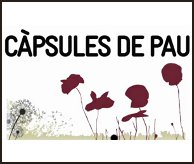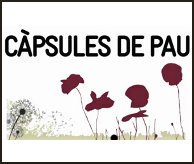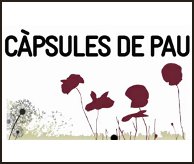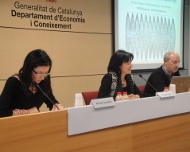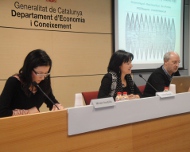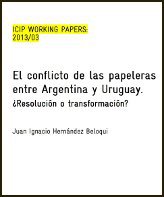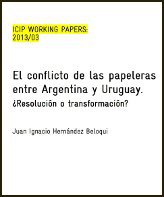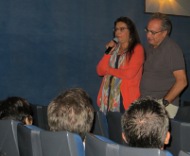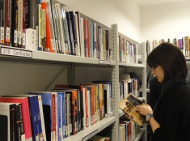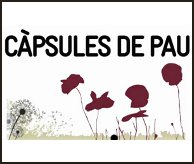A new video of the project ‘Peace Capsules’ , coproduced by ICIP and Col·lectiu Contrast, has been published this week on the ICIP website. It is a short one minute long video entitled ‘What is Peace to Yolanda Aguilar?’ , and in which Aguilar, witness and writer of the Truth Commission in Guatemala, considers what peace means to her. The video is accessible both on the ICIP website and on the ICIP Youtube Channel .
Until the 21st September 2014, International Day of Peace, ICIP will publish a new video capsule each week. Each capsule will count with the participation of an activist, actor or academic who will think of what peace means to him/her. The aim of the project is to compile different approximations to the concept ‘peace’ on the ICIP web site.
Author: whads
What is Peace to Yolanda Aguilar?
A new video of the project ‘Peace Capsules’ , coproduced by ICIP and Col·lectiu Contrast, has been published this week on the ICIP website. It is a short one minute long video entitled ‘What is Peace to Yolanda Aguilar?’ , and in which Aguilar, witness and writer of the Truth Commission in Guatemala, considers what peace means to her. The video is accessible both on the ICIP website and on the ICIP Youtube Channel .
Until the 21st September 2014, International Day of Peace, ICIP will publish a new video capsule each week. Each capsule will count with the participation of an activist, actor or academic who will think of what peace means to him/her. The aim of the project is to compile different approximations to the concept ‘peace’ on the ICIP web site.
What is Peace to Carlos M. Beristain?
The first video of the project ‘Peace Capsules’ , coproduced by ICIP and Col·lectiu Contrast, was published Monday 30th October on the ICIP website. It is a short one minute long video entitled ‘What is peace to Carlos Martín Beristain?’ and in which Beristain, doctor and psychologist specialized in assisting victims of a conflict situation, considers what peace means to him. The video is accessible both on the ICIP website and on the ICIP Youtube channel .
From now and until the 21st September 2014, International Day of Peace, ICIP will publish a new video capsule each week. Each capsule will count with the participation of an activist, actor or academic who will think of what peace means to him/her. The aim of the project is to compile different approximations to the concept ‘peace’ on the ICIP web site.
Challenges to Peacebuilding
Last week ICIP held the seminar “Challenges to Peacebuilding” in Barcelona. Co-organized with the AIPAZ network, the colloquium brought together some forty people involved in peace research. By means of round-table discussions on various themes, the seminar facilitated debate on peacebuilding based on the concept of Johan Galtung’s 3 R’s: resolution, reconstruction and reconciliation.
The first session, on Wednesday, November 27, covered the ethical, legal and military challenges posed by “drones,” or unmanned aerial vehicles. Professors Jaume Saura and Josep Baqués, together with ICIP director Tica Font, discussed the dilemmas now arising from the use of these weapons, which have caused 4000 fatalities over the last decade in over 500 attacks in Pakistan, Yemen, Somalia and Afghanistan. The round-table discussion addressed, for instance, how the use of drones can comply with international humanitarian law or can change the concept of war.
Subsequently, on Thursday, November 28, the seminar began with a round-table discussion on the “Imaginary Sovereignties” project, led by PRIO, and in which ICIP participates. The speakers (Pablo Aguiar, Xavier Alcalde, Rafael Grasa and Pedro Ibarra) presented the uses of the concept of sovereignty and of the nation-state, and their historical evolution. They spoke mostly about the case of the Basque Country, analyzing, for example, the sociology of the pacifist social movements and their impact in the resolution of the conflict.
The third session of the seminar was dedicated to education for peace. Two interesting projects were presented: the analysis, from a peace perspective, of textbooks in the subject of Citizenship (led by Professor Carme Boqué), and the analysis of social science textbooks, also from a peace perspective. The report was published by ICIP.
The fourth round table, with Professors Rafael Grasa, Oscar Mateos and Karlos Pérez de Armiño, dealt with the various theoretical models of peacebuilding and their evolution over the last twenty years. They addressed three practical cases: the reforms applied in Sierra Leone from 2002, at the end of the armed conflict; post-war reconstruction in Mozambique and Angola (former Portuguese colonies); and the current situation in Colombia, in the midst of peace negotiations between the government and the FARC guerrilla movement.
Finally, the seminar addressed the issue of reconciliation with the analysis of justice during transition periods. Professor Claudia Jiménez analyzed the possible channels of rendering justice with the aim of building sustainable peace (analyzing, for instance, the role of the International Criminal Court or the dilemmas posed by amnesty laws and the impunity present in peace processes). At the same round table, the cases of the Peruvian Truth and Reconciliation Commission, and the transition of the FARC in Colombia were discussed with researchers Luis García Villameriel and Yesid Arteta, respectively.
Challenges to Peacebuilding
Last week ICIP held the seminar “Challenges to Peacebuilding” in Barcelona. Co-organized with the AIPAZ network, the colloquium brought together some forty people involved in peace research. By means of round-table discussions on various themes, the seminar facilitated debate on peacebuilding based on the concept of Johan Galtung’s 3 R’s: resolution, reconstruction and reconciliation.
The first session, on Wednesday, November 27, covered the ethical, legal and military challenges posed by “drones,” or unmanned aerial vehicles. Professors Jaume Saura and Josep Baqués, together with ICIP director Tica Font, discussed the dilemmas now arising from the use of these weapons, which have caused 4000 fatalities over the last decade in over 500 attacks in Pakistan, Yemen, Somalia and Afghanistan. The round-table discussion addressed, for instance, how the use of drones can comply with international humanitarian law or can change the concept of war.
Subsequently, on Thursday, November 28, the seminar began with a round-table discussion on the “Imaginary Sovereignties” project, led by PRIO, and in which ICIP participates. The speakers (Pablo Aguiar, Xavier Alcalde, Rafael Grasa and Pedro Ibarra) presented the uses of the concept of sovereignty and of the nation-state, and their historical evolution. They spoke mostly about the case of the Basque Country, analyzing, for example, the sociology of the pacifist social movements and their impact in the resolution of the conflict.
The third session of the seminar was dedicated to education for peace. Two interesting projects were presented: the analysis, from a peace perspective, of textbooks in the subject of Citizenship (led by Professor Carme Boqué), and the analysis of social science textbooks, also from a peace perspective. The report was published by ICIP.
The fourth round table, with Professors Rafael Grasa, Oscar Mateos and Karlos Pérez de Armiño, dealt with the various theoretical models of peacebuilding and their evolution over the last twenty years. They addressed three practical cases: the reforms applied in Sierra Leone from 2002, at the end of the armed conflict; post-war reconstruction in Mozambique and Angola (former Portuguese colonies); and the current situation in Colombia, in the midst of peace negotiations between the government and the FARC guerrilla movement.
Finally, the seminar addressed the issue of reconciliation with the analysis of justice during transition periods. Professor Claudia Jiménez analyzed the possible channels of rendering justice with the aim of building sustainable peace (analyzing, for instance, the role of the International Criminal Court or the dilemmas posed by amnesty laws and the impunity present in peace processes). At the same round table, the cases of the Peruvian Truth and Reconciliation Commission, and the transition of the FARC in Colombia were discussed with researchers Luis García Villameriel and Yesid Arteta, respectively.
ICIP presented the book ‘Llibertat sense por i altres escrits’ (Freedom from Fear)
Last Thursday June 27th was presented at Casa Asia the book Llibertat sense por i altres escrits (Freedom from Fear) , by the Nobel Peace Prize Aung San Suu Kyi. It is the 6th volume of the collection ‘Classics of Peace and Nonviolence’, published by ICIP and Angle Editorial.
The event gathered over thirty people and counted with the participation of Alfons Banda, vice-president of ICIP and Director of the collection, Caterina Garcia, Professor of International Criminal Law and International Relations at the Universitat Pompeu Fabra, and Felix Marti, philosopher and a renowned member of the Catalan peace movement.
Alfons Banda highlighted the ICIP commitment to a progressive fostering of a culture of peace which, though is still not mainstream, will be the substitute of the dominant culture of violence. Banda pointed out the strong commitment of the Catalan society in this sense, bringing to the audience members the memories of the Olympics in 1992; as when the Olympic flame arrived in l’Escala, it was received by one of the sons of Aung San Suu Kyi, who read one of the texts that have been included in the volume that was being presented.
Afterwards, Professor Caterina Garcia contextualized the political situation in Burma, a country which is on a transition process to democracy that started in 2008 with the Buddhist monks Saffron Revolution, and which, with the support of western countries, aims to end the military dictatorship which has subdued the country for decades. Garcia also remarked the importance and the charisma of the Burmese leader Aung San Suu Kyi, which has been criticized on some occasions but which is necessary to legitimate the transition process so that it may come to a successful end.
Philosopher Fèlix Martí explained his recent trip to the region and mentioned the high rates of popularity that the Burmese leader has within the population, even within the Buddhist monks. Martí stressed the radical pacifism of the latter revolts, as well as Suu Kyi’s coherent commitment when she decided to sacrifice her personal and familiar life for the freedom of the several peoples and ethnic groups which shape Burma. Finally, he reintroduced familiar concepts such as ‘democracy’ or ‘fundamental rights’, as these are ideas which also belong to the Buddhist tradition and which Suu Kyi encountered during her trip to India, a very important part of her biography.
The discussion that took place after the presentation counted with the interventions of Rafael Bueno, director of Politics and Society of Casa Asia, and Maria Lluisa Panelas, author of one of the book prologues. Panelas, as an expert on the several translations that have been made of the work of Aung San Suu Kyi, emphasized that the title of the book Llibertat sense por is the best way to translate the original title Freedom from Fear
.
ICIP presented the book ‘Llibertat sense por i altres escrits’ (Freedom from Fear)
Last Thursday June 27th was presented at Casa Asia the book Llibertat sense por i altres escrits (Freedom from Fear) , by the Nobel Peace Prize Aung San Suu Kyi. It is the 6th volume of the collection ‘Classics of Peace and Nonviolence’, published by ICIP and Angle Editorial.
The event gathered over thirty people and counted with the participation of Alfons Banda, vice-president of ICIP and Director of the collection, Caterina Garcia, Professor of International Criminal Law and International Relations at the Universitat Pompeu Fabra, and Felix Marti, philosopher and a renowned member of the Catalan peace movement.
Alfons Banda highlighted the ICIP commitment to a progressive fostering of a culture of peace which, though is still not mainstream, will be the substitute of the dominant culture of violence. Banda pointed out the strong commitment of the Catalan society in this sense, bringing to the audience members the memories of the Olympics in 1992; as when the Olympic flame arrived in l’Escala, it was received by one of the sons of Aung San Suu Kyi, who read one of the texts that have been included in the volume that was being presented.
Afterwards, Professor Caterina Garcia contextualized the political situation in Burma, a country which is on a transition process to democracy that started in 2008 with the Buddhist monks Saffron Revolution, and which, with the support of western countries, aims to end the military dictatorship which has subdued the country for decades. Garcia also remarked the importance and the charisma of the Burmese leader Aung San Suu Kyi, which has been criticized on some occasions but which is necessary to legitimate the transition process so that it may come to a successful end.
Philosopher Fèlix Martí explained his recent trip to the region and mentioned the high rates of popularity that the Burmese leader has within the population, even within the Buddhist monks. Martí stressed the radical pacifism of the latter revolts, as well as Suu Kyi’s coherent commitment when she decided to sacrifice her personal and familiar life for the freedom of the several peoples and ethnic groups which shape Burma. Finally, he reintroduced familiar concepts such as ‘democracy’ or ‘fundamental rights’, as these are ideas which also belong to the Buddhist tradition and which Suu Kyi encountered during her trip to India, a very important part of her biography.
The discussion that took place after the presentation counted with the interventions of Rafael Bueno, director of Politics and Society of Casa Asia, and Maria Lluisa Panelas, author of one of the book prologues. Panelas, as an expert on the several translations that have been made of the work of Aung San Suu Kyi, emphasized that the title of the book Llibertat sense por is the best way to translate the original title Freedom from Fear
.
El conflicto de las papeleras entre Argentina y Uruguay. ¿Resolución o transformación?
El conflicto de las papeleras entre Argentina y Uruguay. ¿Resolución o transformación?
‘Retratos de familia’ (Family Portraits), a documentary on the fight of the Mothers of Soacha
Last Thursday September 26th the documentary Retratos de familia was premiered at the Cinemes Méliès in Barcelona, a film by the Colombian director Alexandra Cardona Restrepo which depicts the struggle of the Mothers of Soacha in Colombia. The documentary narrates the suffering of this group of mothers for the disappearance and extrajudicial execution of their sons, and focuses on their courage to fight for truth and justice and against impunity.
After the screening, the audience had the opportunity to talk with the documentary director. Ms. Alejandra Cardona Restrepo explained that, for her, working with these group of mothers, was a significant learning: ‘They have given us a lesson. They come from poor rural families, no one was supposed to look for and after these boys, but they did; they unburied and brought them back home. They have fought so that no one else has to live a tragedy like theirs. They don’t want revenge, they just demand justice’.
According to the director, Retratos de familia aims at raising social conscience: ‘As long as the atmosphere of terror and violence continues to exist in Colombia, it is necessary to raise public awareness, and cinema is a very useful tool to do so. We can all contribute to make peace, to building a strong and lasting peace. We can all do so, except the guerrilla and the corrupt politicians, who have already proved they can’t’.
The premiere also counted with the participation of ICIP president, Rafael Grasa, who is an expert on the conflict in Colombia. Grasa summoned the audience to notice that ‘precisely now, when the peace process in Colombia is ongoing, it is more important than ever to maintain the solidarity towards the Colombian people and to fight against impunity, so that tragedies such as the Soacha one are never forgotten and repeated, as they are great violations of human rights’.
Retratos de familia has been a success among the public so far and will also be presented at several different places in Colombia in the near future.
The screening at the Cinemes Méliès in Barcelona was co organized by ICIP, the Taula per la Pau i els Drets Humans a Colòmbia and the Human Rights Institute of Catalonia.
ICIP library reopens with regular hours
The library of the International Catalan Institute for Peace, located on Gran Via de les Corts Catalanes 658 (ground floor), Barcelona, will open its doors again to the public on September 2 with regular hours (Monday to Thursday from 9:00 to 14:00 and 15.00 to 18.30, and Friday 9:00 to 14:00).
The International Catalan Institute for Peace Library is designed to be a center specialized in the topics of Peace, Human Security and Conflict. The purpose of the library is to facilitate and allow access to the literature belonging to these fields and to make research materials available to the public. It is a reference center that is one of a kind within Catalonia.
The library serves as a base for the International Catalan Institute for Peace, with the literature it contains being essential to both researchers and experts in the Peace Research field. The center forms part of a network of specialized libraries sponsored by the Generalitat of Catalonia (the Catalan Government)and is in constant contact with institutions and research centers with similar objectives located around the world.
What is Peace to Gabriela Serra?
A new video of the project ‘Peace Capsules’ , coproduced by ICIP and Col·lectiu Contrast, has been published this week on the ICIP website. It is a short one minute long video entitled ‘What is Peace to Gabriela Serra?’ and in which Serra, member of the Catalan Pacifist Movement, considers what peace means to her. The video is accessible both on the ICIP website and on the ICIP Youtube Channel .
Until the 21st September 2014, International Day of Peace, ICIP will publish a new video capsule each week. Each capsule will count with the participation of an activist, actor or academic who will think of what peace means to him/her. The aim of the project is to compile different approximations to the concept ‘peace’ on the ICIP web site.

